I’m sure Ted Cruz isn’t the only candidate vying to be United States president to think this, but thankfully such bigotry isn’t usually voiced. However, as Cruz is mainly relying on the evangelical Christian vote to get him votes in the Republican primary race, making such statements won’t do him any damage with that constituency.
He made the statement at the National Religious Liberties conference in Iowa last Friday (6 November). According to the Christian Science Monitor, Cruz stated:
“Any president who doesn’t begin every day on his knees isn’t fit to be commander in chief of this nation.”
Personally, I find the idea of a commander-in-chief making his or her decisions via prayer really scary. We’ve already had that, and almost all Cruz’s compatriots, not just the Democratic ones, recognize that was a disaster. I am, of course, talking about the presidency of George W Bush.
In the weekly newsletter from the Richard Dawkins Foundation for Reason and Science, the response to Cruz’s the comment was simply:
Wow. Talk about having things backward.
Atheists aren’t well thought of in the United Stated. I’ve posted a few of these statistics before, some as recently as last weekend, but they bear repeating. According to a 2014 Pew survey, when asked if they would vote for an atheist, 40% of USians said they wouldn’t.
The figure of 40% though, is the best it’s ever been in the United States. The question has been asked periodically since 1958, with the following results:
As can be seen, it wasn’t until 2011 that the “Yes” I would vote for an atheist line started to stay above the “No” I wouldn’t line. In New Zealand we’ve had atheists prime ministers continuously since 1999, from both major political parties. I’ve no idea of the religious affiliation of most candidates in our parliament. Unless their beliefs (or anything else about them) are going to make an otherwise capable politician ignore the laws of the country, they are irrelevant.
This view is fairly standard in modern New Zealand. We’ve had many LGBT politicians (well, only one transgender, but she’s still the only one in the world), and many religions, cultures, disabilities and ethnicities are represented, and not just at a token level. Maori and New Zealand sign language are official languages along with English, and Maori is spoken in the chamber on a regular basis with translation constantly available.
Veteran’s Day (the US equivalent of ANZAC day) was yesterday – 11th November. Thus I feel it appropriate to post this meme that has been making the rounds at least as long as I’ve been on Twitter:
The attitude of Ted Cruz is clearly not atypical, when a former president feels it’s okay to express such vile bigotry.
I subscribe to a number of on-line publications in order to try and keep my knowledge of what’s going on in the world up-to-date. One is a Christian publication. Because of that I got an invitation to donate to Ben Carson’s campaign back on 30 September. (This is probably illegal as I’m not a US citizen, but there’s no danger of me donating, and if I tried I assume my attempt would be blocked.) The last sentence of that e-mail finished with the words:
Together, we will once again be One Nation under God, indivisible, with liberty and justice for all.
This idea that the United States is one nation Under God is one that has been pervasive in the current GOP primary. Ben Carson has also written a book called A More Perfect Union: What We Can Do To Reclaim Our Constitutional Liberties, and is currently promoting it. It’s a #1 bestseller on Amazon, which shows the popularity of the idea that the country is favoured by God.
Indeed, many US states have laws that require people to be Christian in order to hold government office. These laws are illegal under the US Constitution and if anyone challenged them in court, they would win. However, the current likelihood of an openly atheist candidate winning an election in these states, particularly the southern ones, is somewhere around zero.
A study reported in USA Today in 2011 showed that USians antipathy towards atheists related to an opinion that they are morally lacking and simply not trustworthy.
“It’s pretty remarkable,” said Azim Shariff, an assistant professor of psychology at the University of Oregon and a co-author of the study, which appears in the current issue of Journal of Personality and Social Psychology.
The study, conducted among 350 Americans adults and 420 Canadian college students, asked participants to decide if a fictional driver damaged a parked car and left the scene, then found a wallet and took the money, was the driver more likely to be a teacher, an atheist teacher, or a rapist teacher?
The participants, who were from religious and nonreligious backgrounds, most often chose the atheist teacher.
The study is part of an attempt to understand what needs religion fulfills in people. Among the conclusions is a sense of trust in others.
“People find atheists very suspect,” Shariff said. “They don’t fear God so we should distrust them; they do not have the same moral obligations of others. This is a common refrain against atheists. People fear them as a group.”
I find it quite shocking that a rapist is, on average, considered more trustworthy than I am by the US population. That kind of ignorance shows why we atheists need to speak out where we can, so others know we’re not scary. In fact, studies show that, on average, we’re less scary than the rest of the population.
There has been some push-back on Cruz’s comment, even in Christian publications. Hopefully that means that the rise in atheism, and the greater knowledge of what it is, means that comments such as Cruz’s are becoming less common and, more importantly, less acceptable.

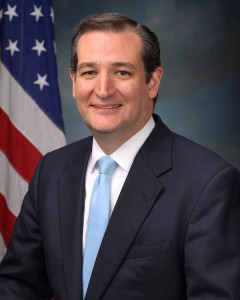
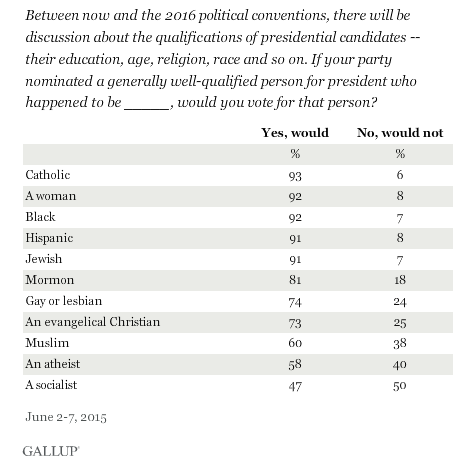
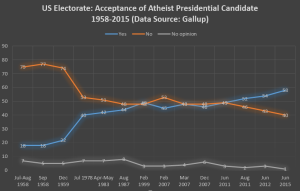
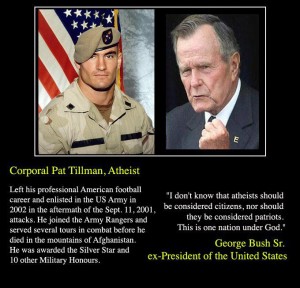
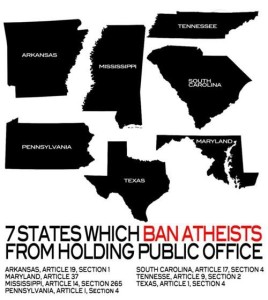

Isn’t it something? As you can see by the first plot acceptance was much lower in the decade following WWII when the U.S. suffered through the “red scare”. There was terrific fear of the Soviets not only because they were nuclear adversaries, but because they were atheists. Their atheism was emphasized by religious leaders and politicians pandering to the religious(Sen. Joe McCarthy). Thus, atheism and immorality went naturally together in the popular conception. That’s when president Eisenhower approved “in god we trust” on money and “under god” added to the pledge of allegiance. Then came the baby boom and the young rebelliously rejected their parents bigotry to an extent. The ‘no’ curve in the chart came down. The rest is history.
The Soviets were nominally atheist but they never quite succeeded in wiping religion out entirely. The same goes for pretty much all of the communist countries. In North Korea, they replaced religion with Juche, a quasi-political pseudophilosophy. Of course, that didn’t keep the fearmongerers from their favorite sport.
I think those who say North Korea is atheist are using a false definition. The people there are taught to worship the Dear Leader as if he’s a living god. That isn’t atheism. It really annoys me when I see North Korea listed as an atheist country. As far as I’m concerned, it’s about propaganda against atheism more than anything else.
That worship of the Dear Leader is the Juche I mentioned.
I’ve looked it up now. I’d never heard of the term before. Very cool to be learning new stuff every day. 🙂
“it’s about propaganda against atheism more than anything else.”
Good point.
Some time ago, I read something about the Ryugyong Hotel, which is something the North Koreans have been building since 1987 and still haven’t finished. I used Google Maps to get a look at the thing and I was amazed, not by the hotel, but at Pyongyang itself. It’s a city with two and a half million people, but from the maps view, there’s hardly a sign of life. Very little traffic even on the main streets and little evidence of the sort of activity you’d expect to see in a large city during the day. What a dismal place that must be. You can take a look for yourself at https://www.google.com/maps/place/39%C2%B002'11.0%22N+125%C2%B043'50.0%22E/@39.036389,125.730556,3362m/data=!3m1!1e3!4m2!3m1!1s0x0:0x0?hl=en
Amazing. It’s got less traffic than my town, which has about 3,800 people and is in one of the poorest areas in the country.
And if you go to http://eoimages.gsfc.nasa.gov/images/imagerecords/55000/55167/earth_lights_lrg.jpg, you will see that South Korea is all lit up while North Korea is almost completely dark. S.K. looks like it’s an island.
This image is even more telling: http://i.space.com/images/i/000/024/653/i02/black-marble-earth-night-5.jpg?1356625432
I’ve seen these before, but I’m glad you posted them. They’re very telling.
I posted this short documentary on the Heather’s Homilies Facebook page the other day: https://www.youtube.com/watch?v=u0QVkf-B0qc&feature=share
I was quite shocked by it. It seems the South Koreans have developed a very negative attitude to defectors, and so many are having trouble adjusting and some have even tried to go back. There’s one man near the beginning who tells of escaping from a regime where he was being brainwashed, and now he’s expected to commit his life to Jesus. Many of those groups that are helping are evangelical Christians, which must be very difficult for the defectors as they’ve seen through one form of brainwashing and are basically being asked to take on another form. This wouldn’t be happening if the government had a proper resettlement programme.
North Korea is a Monarchy, hereditary. With the Holy Korean Emperor being the living god on Earth. Etc.
Posing as Communist like all of them. Ignore Marx from the beginning. Just put on a show to cover their same old elite ruling the peasants. Russia, China, etc.
I understand Eisenhower had just converted to Presbyterianism too, after previously not being religious?
It shows what propaganda can do. The Europeans were much more adversely affected by Russia, but they didn’t develop the fear of atheism or socialism that the US did. McCarthy has a lot to answer for.
I’ve often said that if I had a choice between two candidates, and their qualifications and positions were the same except that one was atheist and the other religious (regardless of sect, cult or denomination*) I would vote for the atheist. I would rather trust someone who believes in doing the right thing because it’s right rather than someone who does the right thing because some preacher has him scared shitless about what’s going to happen after death.
*Actually, they’re all cults.
I agree. Also, on a slightly different note, I find the idea that the only reason a person is good is fear of divine retribution, that means they’re not really good. I would be a bit scared of such a person.
Running for president at the time GHWB did say he didn’t think Atheist’s count as American citizens. Our Founders would be appalled at just how much religious the US is now than 320 years ago. Why I fear we will become the largest most dangerous theocracy to ever exist on the planet.
My 2 cents worth. What your founders did was great. However, since then too many have thought it’s so good the system doesn’t need to be examined, and now too many people with the power to prevent change are invested in maintaining the status quo. A lot of USians believe that they still live in the greatest democracy. It’s a great country, but no longer the greatest democracy. Unfortunately, it’s seen as unpatriotic to criticize the system. Other countries have been able to advance their level of democracy by seeing change and improvement as patriotic.
Everybody would say improvement is patriotic and constitutive of the common good. But one person’s notion of “improvement” is the other person’s definition of deterioration, and vice versa. Among other things, democracy means there is no “improvement” without consensus — and dissenters have the right to resist being “improved”.
That’s true, and the essence of democracy. What I have a problem with is that even the suggestion that the US’s system needs to change is often met by charges of lack of patriotism. My opinion is it’s a subject that needs to be discussed. Of course, no changes should be made without a broad consensus of the electorate.
George Dumbya Bush said something similar in ’04. When the news hit that there were military Wiccans holding ritual at Fort Hood, he said that Wicca and other Neopaganisms were not real religions, should be banned from the military and did not deserve First Amendment protection.
Excellent piece. You are not alone in being a non-American who would not vote for them anyway who has been contacted by Republican campaign teams – I have received several such emails.
That’s interesting. They should be able to screen out those of us (like you and me) who have a country identifier in our e-mail addresses. I can understand them going to a gmail.com address or similar, but not so much one that is associated with a particular country.
In ’08, I got a call from the state Republican party. The woman who was calling asked to speak to my mother. My mother had died in ’02. When I asked why she was soliciting votes from dead people, she hung up.
While a few state constitutions retain moot language ostensibly barring non-believers from office, they were struck down by the courts decades ago. They do not require an officeholder be Christian. In fact a couple explicitly provide that there shall be no religious test — as long as you don’t deny God.
The office of POTUS is head of state, commander in chief, and symbolic national leader in times of trouble. While trustworthiness and character are important for any office, when it comes to the presidency, it’s another level. People choose a president by the lights of their own personal judgement.
Bigotry doesn’t enter into it. Atheism is a chosen ideology, not an immutable, God-given trait. Denying God just makes no sense to most people. At best it seems eccentric.
Like it or not, Cruz is absolutely right. A president must possess the wisdom, prudence and humility to acknowledge her or his own limits, to reflect soberly on grave decisions, to seek the wise and just course with discernment and deliberation, and to see it through with God’s help.
That’s just the thing…atheists do deny god. Yes, atheism is a chosen ideology. It’s a choice to believe in evidence and reason rather than ancient myths and supernatural characters. Cruz is a bigot and a hater. God help us if he ever becomes President.
“…to see it through with God’s help.”
Really? What god? The Christian gods, or is Allah or Yahweh acceptable? How about Shiva or Vishnu or Brahma? Zeus? Would all these gods have the same outlook on what a leader should do and offer the same help? And how does one get the help…does the leader get an email from god telling them what to do, a tweet, a dream, a whisper in the ear, a vision? This is just plain silly. Cruz is absolutely wrong, as all bigots are. Sorry, your argument doesn’t stand up to reason, which is what I use to judge a person’s ability to lead. And not one of the Republican hopefuls, (except maybe Kasich) use reason to any appreciable extent. Have you seen any of the debates? Reason has flown the coupe, even when in the national spotlight.
I have found atheists to be the most humble, thoughtful, moral and well adjusted humans on the planet. Just the fact that someone believes the creator of time, space and the universe, an omnipotent, omnipresent, omniscient god is personally “helping” them is the exact opposite of “wisdom, prudence and humility” and has no bearing on a leader acknowledging their own limits. If anything, it fills them with arrogance, an inability to listen, and promotes the attitude of shoot first, ’cause, you know, my benevolent god will sort it out later. As Heather correctly called out Bush for his disastrous Presidency relying on god’s infinite whatever to “help him” make the right decision.
The US will be a much better place to live for ALL citizens once the notion that some of us are “under god” has been pushed into the trash bin, along with the mass delusion this belief in god manifests in the human brain.
“…to reflect soberly on grave decisions…”
Like whether or not sack cloth and ashes and covering oneself in manure is the correct course of action, or whether the death penalty should be used outright to prevent a wedding ceremony? (Like Cruz’s host at this event.)
I’d like to see the evidence for those laws being struck down as it’s not my understanding. I know there are some laws such as these that have been removed, but these states retain them as far as I’m aware. I could be wrong of course, but I’d like the evidence.
Most of your sentence is quite correct. “A president must possess the wisdom, prudence and humility to acknowledge her or his own limits, to reflect soberly on grave decisions, to seek the wise and just course with discernment and deliberation …” – if the sentence has ended there I would agree. Adding God into the mixture is requiring, at the very least, for a president to believe in God, and as you’ve used a capital “g”, a monotheistic one. The problem I see here is that even given the assumption supernatural beings exist, you can never know for sure which one is influencing you at a particular time. Better to get your counsel from a range of experienced people with proven ability and judgement in the topic under consideration and weigh the evidence and advice carefully.
Google Torcaso v. Watkins regarding the Supreme Court ruling.
A wise person would solicit human advice as a complement to divine guidance, not merely as a cheap substitute.
Without proof any god exists, divine guidance is just talking to an imaginary friend.
I accept that meditation (as opposed to prayer) can be a valuable tool in ordering the mind for many.
I think that aggressive anti-religionists who sue to stop prayers at council meetings and remove the ten commandments from statehouses contribute to the unpopularity of atheism in the US. Telling people they are abusing their children by bringing them up religious is not the best way to win friends and influence people.
Bill Maher agrees with you — “Suing to take a cross off a building? For heaven’s sake, we’re not vampires.”
There are always going to be people who get people’s backs up. There are better ways of expressing things quite often. However, you’ve got to remember that many of the recent instances of government organisations deciding to display the Ten Commandments, institute prayers etc are deliberately done by Evangelical Christians in order to force their viewpoint on everyone. Someone needs to stand up to them. They’re not just doing it for atheists, but for other religions, and for the many Christians who want to retain separation between Church and State, as your Constitution states. Many people wouldn’t even know we exist, and while there may be some loud opposition, there’s a lot of quiet support too.
Rachel Maddow had a segment about the event at which Cruz made that remark about getting on his knees. (Youtube vid should start at 6.27.)
Preacher Ted Swanson made an impassioned speech about why gays deserve the death penalty (although for once he decided to leave it up to God to mete out the punishment). Then he introduced the special guests — Cruz, Huckabee and some other idiot who I’ve forgotten.
Obviously, anyone who would associate with such a loon is not fit to hold office.
Thanks for the link Yakaru. This is really disturbing. Watching this, you just know that if someone like Swanson had been brought up in a different society, he’d be happily throwing gays off buildings. It was very disturbing. If Cruz, Jindal, and Huckabee had any integrity they would have refused to take the stage after Swanson’s speech.
Good piece Heather, I agree completely. The notion of “American Exceptionalism” is a direct result of believing we Americans are all children of god (well, at least the white citizens). Cruz is simply an arrogant fool, self-assured in his delusional world-view, and unfit (perhaps other than Carson the most unfit) to be POTUS. I couldn’t even imagine what America would turn into under someone like Cruz or Carson (and the entire world would suffer as a result). America is just starting to come out of the horror that was Bush’s Presidency; going back to the ideology of any of these blinkered candidates would be a repeated and colossal step towards malfunction and decline.
Nabil Shaath, who was Palestinian foreign minister at the time, said: “President Bush said to all of us: ‘I am driven with a mission from God’. God would tell me, ‘George go and fight these terrorists in Afghanistan’. And I did. And then God would tell me ‘George, go and end the tyranny in Iraq’. And I did.”
Mr Bush went on: “And now, again, I feel God’s words coming to me, ‘Go get the Palestinians their state and get the Israelis their security, and get peace in the Middle East’. And, by God, I’m gonna do it.”
The Guardian, 7 Oct 2005.
Very disturbing. I vaguely remember a comment about God being in the Oval Office with him too.